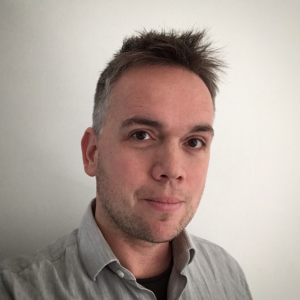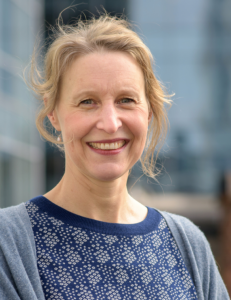RETHINKING THE VERNACULAR: TRANSDISCIPLINARY DESIGN THINKING IN ANIMATION & ARCHITECTURE
(SAS2019-10880)
Mark Collington (United Kingdom)1; Sandra Denicke-Polcher (United Kingdom)2
1 – Arts University Bournemouth; 2 – London Metropolitan University
Mark Collington
Mark Collington is a Senior Lecturer in Animation at the Arts University Bournemouth, where he teaches production research & development. He previously ran BA & MA Animation at London Metropolitan University (2013-18). He is an MA Animation graduate from the Royal College of Art (2001), and HEA Fellow (2018). He has also worked in London and Paris in commercial and independent animation production, fashion illustration and brand development. His research is founded on exploring how to apply cultural theory in art, design, and moving image, to the research and development of storytelling in independent and client-led animation projects, which he consolidated in his book ‘Animation in Context – A Practical Guide to Theory and Making’, published by Bloomsbury (2016). Mark’s subsequent interdisciplinary research has focused on how to apply cultural theory and practice from film and animation to the development of innovations in design thinking in Architecture, and Biomedical Science.
Sandra Denicke-Polcher
Sandra Denicke-Polcher is acting Head of Architecture at London Metropolitan University (LMU), teaching the Live Projects Studio since 2000. She graduated with Dipl.-Ing. at TU Berlin (2000), and with the AA Diploma at the Architectural Association School of Architecture (1998). She is a University Teaching Fellow (LMU, 2017), and HEA National Teaching Fellow (2018). Her research explores how design teaching can be enhanced through vertical studio delivery (across year groups); involvement with clients, stakeholders and communities; and where the tutor becomes a co-constructor of knowledge. She has explored the opportunities and challenges of engaging with live projects and other disciplines, particularly film & animation. With an emphasis on public projects, initiated by students and tutors, her work identifies the complex relationships between architectural education and practice. Projects include Crossing Cultures, Made in Hayes, The Aldgate Project, Outdoor Stage in Kronberg.
Abstract
This paper demonstrates how a synthesis of different cultural theories and practices from animation, film and architecture can produce new forms of transdisciplinary design thinking. The focus has been on how ephemeral interventions in a specific place i.e., aesthetic experiences in the form of projection mapping are becoming essential public engagement tools to change preconceptions, initiate urban redevelopment and, thus, drive social change. Cultural theories underpinning this work include the parallel concepts of montage (Vertov) and dérive (Debord), as well as mise-en-scène (Bazin) and the picturesque (McArthur), introducing the concept of “place” directly through animation, with the added dimensions of time and sound.
Over four years, we have advanced insights into the relationship between analogue and digital design outputs and the rapid turnaround needed for moving image design solutions in architecture; understanding how a rough and ready, stop motion, ‘sketch’ can communicate design atmospheres better than accurate CG models. Case studies from our fieldwork with animators and architects, in London and Belmonte (Italy), illustrate how this ‘lo-fi approach has been applied to client-led, site-specific projects – projection mapping proposals in public spaces and onto buildings ‘in situ’. The paper concludes with how this research has laid the foundation for developing knowledge transfer initiatives to stimulate new areas of employment in animation and architecture.
Palavras-chave: Projection Mapping, Stop Motion, Knowledge Transfer, Architectural Design, Transdisciplinary Design Thinking
 1 – Mark Collington (United Kingdom)
1 – Mark Collington (United Kingdom)
 2 – Sandra Denicke-Polcher (United Kingdom)
2 – Sandra Denicke-Polcher (United Kingdom)


